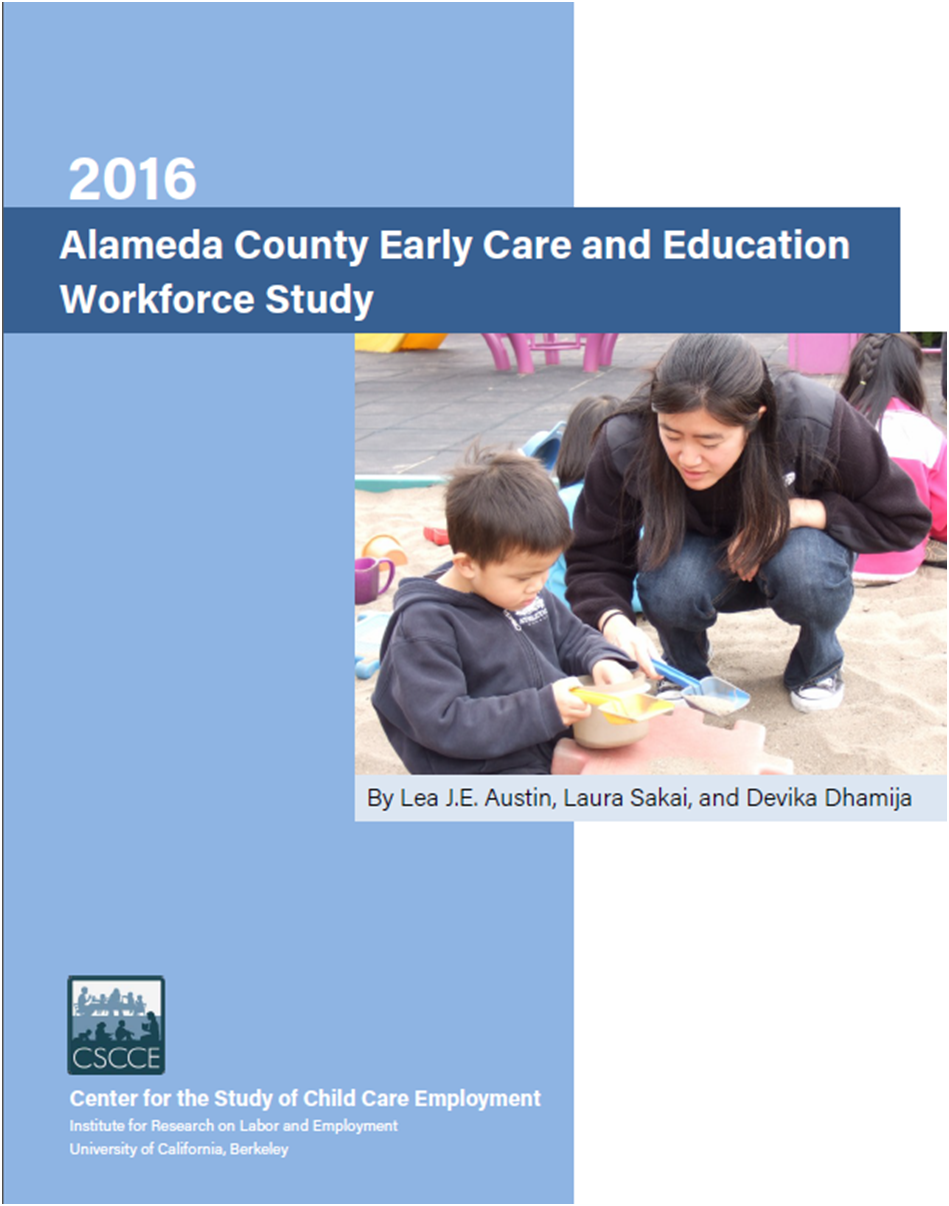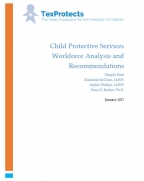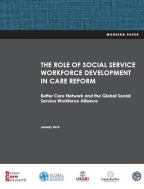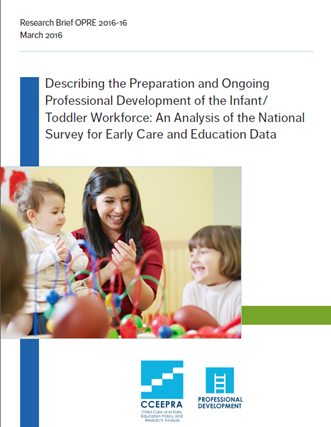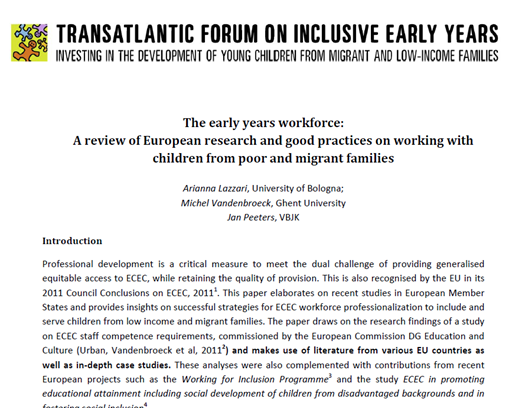Training & professional development
Summary:
The relationship between teacher qualification and the quality of early childhood care and learning environment attempts to synthesize the empirical evidence on the relationship of teacher qualifications on the quality of early childhood learning environments. The study aims to answer one question:Is there a relationship between the level and type of education of the lead teacher, and the quality of the early childhood learning environment, as measured by the Early Childhood Environment Rating Scale, the Infant Toddler Environment Rating Scale and their revised versions?The authors review 48 studies with 82 independent samples from 1980 to 2014, examining the relationship between teacher qualification and the quality of ECEC environment. The results draw upon information from quantitative research data from a number of countries, showing that higher qualifications of teachers are significantly correlated with higher quality ECEC.
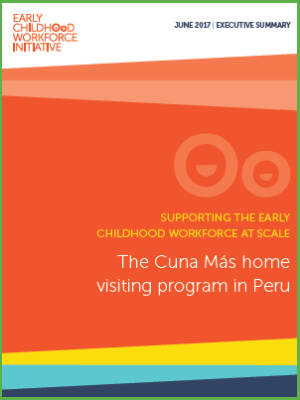
Summary:
The Early Childhood Workforce Initiative Country Study Series examines ways to strengthen and scale up a quality workforce. The first of these studies, Supporting the early childhood workforce at scale: The Cuna Más home visiting program in Peru, focuses on Cuna Más, a large-scale ECD program in Peru.
As one of few home visiting programs operating – and having been evaluated – at scale in low- and middle-income countries, Cuna Más holds valuable workforce lessons that may resonate more broadly with ECD programs and policymakers seeking to reach young children and families around the world:
-
Supervision in the field is critical for the home visiting workforce, particularly in rural contexts where many workers have limited training or experience and work independently much of the time.
-
In addition to delivering important content, educational materials are critical for empowering community home visitors who may not have the training or experience to otherwise provide guidance to young children and families.
-
It is important to identify and address workers’ travel-related barriers, especially in rural or remote areas
-
Career ladders and pay scales can reward both professionals and volunteers for their dedication, retain and leverage the experience of high-performing individuals, and encourage strong candidates to see working in ECD as a viable career path, rather than temporary employment.
Home visiting is often used to reach vulnerable young children as well as their caregivers. Trained individuals regularly visit a caregiver and child to improve parenting behaviors, the home environment, and impact child outcomes. The Cuna Más home visiting service enjoys relatively high coverage and early results are promising: a recent impact evaluation by the Inter-American Development Bank (IDB) found large effects on children’s cognitive and language development. However, operating at scale presents challenges to quality and sustainability.
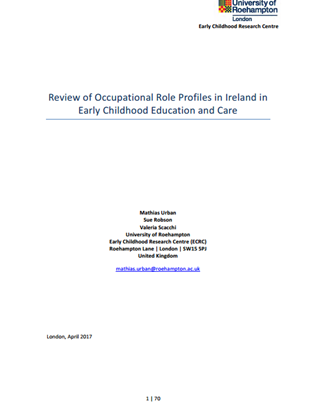
Summary:
Review of Occupational Role Profiles in Ireland in Early Childhood Education and Care presents a profile for the early childhood profession in Ireland.
The aim is to develop the Irish early childhood care and education sector into a genuine Competent System. A central requirement for achieving this goal is a shared orientation for all practitioners working with children from birth to eight years, regardless of occupational status, job title and level of formal qualification.
The concept of Competent Systems in early childhood has been developed by the CoRe project – an international study that investigated Competence Requirements in Early Childhood Education and Care on behalf of the European Commission (Urban, Vandenbroeck, Van Laere, Lazzari, & Peeters, 2011). Central to a competent system is that shared orientations are not only required of practitioners ‘on the ground’ but of all professionals and institutions that together constitute the early childhood system: early childhood settings, training and professional preparation, research, regulation and governance, inspection and evaluation.
Summary:
2016 Alameda County Early Care and Education Workforce Study aims to inform policy, planning and advocacy efforts in California, specifically Alameda County. The study collected countrywide information about teaching staff employed by center-based ECE programs with the goal of identifying the demographic, education and employment characteristics of Alameda Country’s center-based workforce. The data is intended to inform policy makers and to serve as a resource for stakeholders interested in information on the state of the early childhood workforce to inform policymaking, planning and the investment of resources.
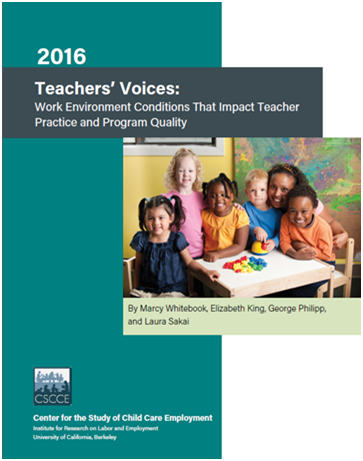
Summary:
Teachers’ Voices: Work Environment Conditions That Impact Teacher Practice and Program Quality presents the findings from the SEQUAL study focused on teaching staff. Supportive Environmental Quality Underlying Adult Learning (SEQUAL), developed by the Center for the Study of Child Care Employment (CSCCE), is used to document contextual information about workplace conditions that impact teacher practice and program quality and to build a vocabulary for the field around teachers’ needs for workplace support. The tool addresses five critical areas of teachers’ learning environments:
- Teaching supports;
- Learning opportunities;
- Policies and practices that support teaching staff’s initiative and teamwork;
- Adult well-being; and
- How supervisors and program leaders interact with staff to support their teaching practice.
In this study, assistant teachers, teachers, lead teachers and administrators employed at the 42 center-based early care and education programs reported assessments of their work environments for each of the five SEQUAL domains. This resource presents information for each of these domains, as well as recommendations for funders and policymakers.
You can find out more about SEQUAL on the CSCCE website here.
Summary:
Child Protective Services Workforce Analysis and Recommendations looks at the growing issue of child abuse in Texas and the great challenge of retaining a high-quality workforce in the state’s Child Protective Services (CPS). This documents explores trends and past reforms in the state, before addressing the issue of workforce turnover. Several issues that contribute to turnover are addressed, as well as the stages of the system.
Summary:
The Role of Social Service Workforce Development in Care Reform illustrates key issues by drawing on the experiences of Indonesia, Moldova and Rwanda – three countries are in the process of reform. Each country's reform takes place within their own context and history, social and political system, protection structure and services, and social services education system.
The case studies highlight each country’s reform processes and identifys learning in terms of the approach taken to strengthen and align the social service workforce given the needs of the system, the scope and actors involved, and the different care reform strategies and outcomes. The case studies are presented with recognition of the ongoing and dynamic process and are examples from different stages and contexts of reform.

Summary:
Despite increased funding and many reforms, most education systems are still seeking ways to better prepare their students for a world in which technological change and the digital revolution are changing the way we work, live and relate to one another. Education systems that have succeeded in improving student outcomes show that the way forward is by making teachers the top priority. The adaptability of education systems and their ability to evolve ultimately depends on enabling teachers to transform what and how students learn. This requires strong support and training for teachers, both before and after they enter the profession, with new forms of professional development to help teachers engage in more direct instruction and adapt it to the needs of their diverse classrooms. Education systems need to perform well in two dimensions: excellence and equity. Many high performers do well on both, demonstrating that they are not mutually exclusive. To do so requires specific measures to overcome factors that can hinder student performance, such as socio-economic background, immigrant status and gender.
Summary:
Describing the Preparation and Ongoing Professional Development of the Infant/ Toddler Workforce: An Analysis of the National Survey for Early Care and Education Data presents an analysis describing the professional development activities of the United States’ Infant/Toddler (I/T) workforce. The analyses shared in this brief aim to help the filed better understand the strengths and needs of the I/T workforce in center-based and home-based early care and education programs.
Summary:
The early years workforce: A review of European research and good practices on working with children from poor and migrant families elaborates on recent studies in European Member States and provides insights on successful strategies for ECEC workforce professionalization to include and serve children from low income and migrant families. Four questions are central to this research:
- What competences do professionals need to work with children from low income and migrant families?
- What kind of initial professionals need to work with children from low income and migrant families?
- What kind of continuing professional development is needed?
- What kind of governance is needed?





